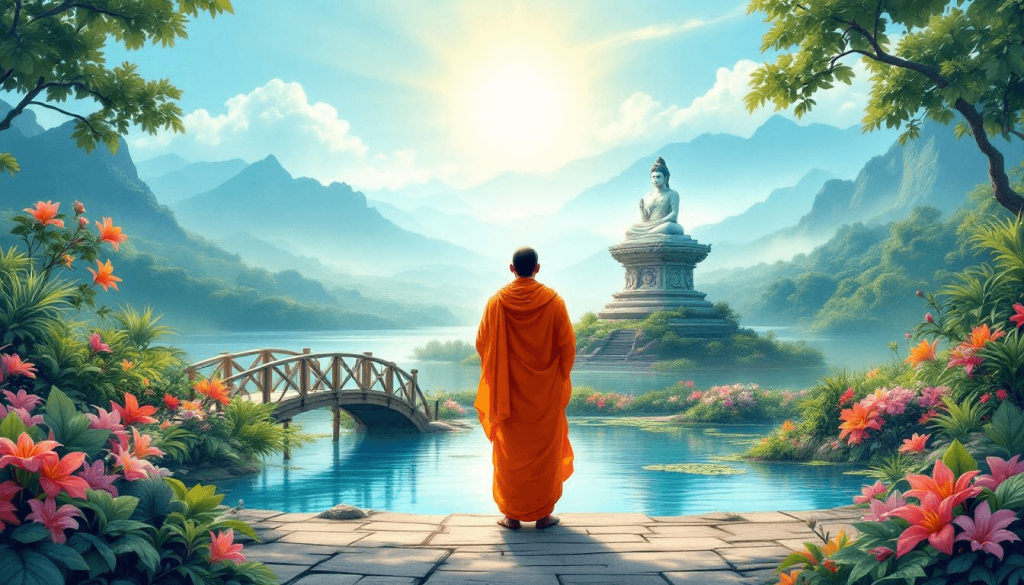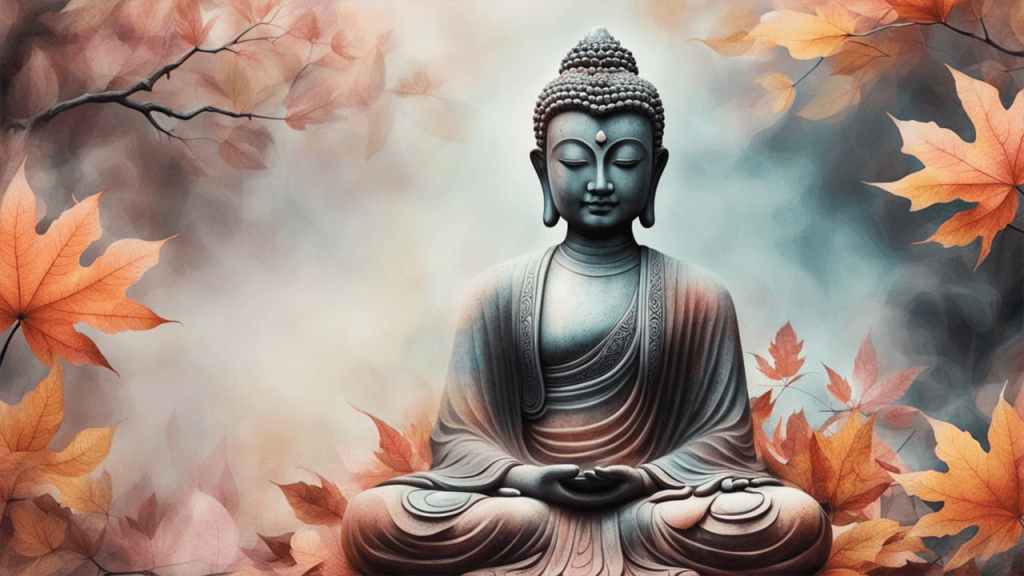How Dharma Shapes Life in Hinduism and Buddhism
Aryan K | January 10, 2025

- Key Takeaways
- Defining Dharma in Modern Times
- Dharma in Hinduism
- Dharma and Karma: A Symbiotic Relationship
- The Importance of Dharma in Higher Learning
- Dharma in Buddhism
- Dharma Across Different Ages
- Religious Texts on Dharma
- Dharma's Role in Community and Culture
- The Global Relevance of Dharma
- Summary
- Frequently Asked Questions
Dharma, in Hinduism and Buddhism, is the principle that guides moral and ethical behavior. It represents one’s duty and the natural law. In Hinduism, dharma focuses on duty and social order. In Buddhism, it means following the Buddha’s teachings for enlightenment. Understanding dharma helps in navigating ethical decisions and living harmoniously.
Key Takeaways
Dharma serves as a foundational concept in both Hinduism and Buddhism, guiding ethical behavior and moral duty while reflecting deep historical significance.
In Hinduism, dharma is closely linked to social order and individual duties, while Buddhism interprets dharma as the path to spiritual enlightenment, emphasizing personal understanding and effort.
The interconnectedness of dharma and karma highlights how fulfilling one’s ethical responsibilities influences both present and future experiences, establishing a framework for moral decision-making.
Defining Dharma in Modern Times
Dharma, derived from the Sanskrit root “dhri,” signifies support and stability, indicating its essence as something established or firm. This ancient term, often translated as virtue or righteousness, encompasses behaviors aligned with the moral order that sustains life in Indian religions. The term has no direct translation in Western languages, making its understanding across different cultures more complex.
Today, dharma remains a guide for ethical living and moral duty. It addresses modern ethical dilemmas and influences personal conduct, reflecting its historical evolution. Modern views highlight its relevance in areas ranging from personal decisions to societal norms.
Translating dharma into Western contexts poses challenges due to its profound implications. The concept is intricately linked to the Vedic notion of Ṛta, the cosmic order that regulates the universe, making it difficult to distill into a single word or phrase. In essence, dharma provides an ethical framework that guides an individual’s actions, while karma represents the consequences of those actions.
Dharma in Hinduism
In Hinduism, dharma is fundamental for maintaining social order and harmony. It guides individuals’ actions and duties, ensuring that society functions smoothly. This duty and moral law is deeply rooted in Hindu philosophy, serving as a path to moksha (liberation), influenced by accumulated karma.
The interpretation of dharma varies significantly across different religions, including Hinduism, Buddhism, Jainism, and Sikhism, each offering unique perspectives on its meaning. Adhering to dharma in Hinduism is a way of life, that influences everything from daily routines to major life decisions.
While Hinduism associates dharma with duty and moral law, Buddhism focuses on understanding the nature of existence. This variation in interpretation highlights the richness and complexity of dharma, making it a versatile and enduring concept across different spiritual traditions.
Dharma and Karma: A Symbiotic Relationship
Dharma and karma share a symbiotic relationship, creating a framework for moral and ethical decisions. Fulfilling one’s dharma is believed to lead to positive karma, enhancing future life experiences. This interconnectedness ensures that individuals strive to live virtuously, knowing that their actions have long-term consequences.
Karma, shaped by past actions linked to dharma, affects both present and future lives. This cyclical nature of action and consequence underscores the importance of adhering to one’s dharma. In the Bhagavad Gita, Krishna advises Arjuna to perform his duty without attachment to outcomes, highlighting a core principle in both Hinduism and Buddhism about detachment from results.
Understanding the interconnectedness of dharma and karma provides a comprehensive framework for navigating life’s moral and ethical decisions. It encourages individuals to acknowledge the impact of their actions and strive for a balance between duty and detachment.
The Importance of Dharma in Higher Learning
India’s traditional Gurukul system emphasized the sacredness of imparting knowledge and preserving cultural values in education. This ancient system highlighted the importance of dharma in shaping not only intellectual capabilities but also moral character. Swami Vivekananda, a renowned spiritual leader, believed that true education reveals the inherent perfection in individuals rather than merely serving as a means to obtain degrees.
Today’s education system, with its focus on super-specialization, often overlooks the broader understanding integral to ancient Indian teachings. The New Education Policy in India aims to reintegrate local languages into the curriculum while promoting a more holistic approach to learning. This shift seeks to restore the balance between specialized knowledge and cultural values.
In education, dharma acts as a moral compass, guiding individuals to support communal harmony and ethical living. Integrated into modern legal and ethical frameworks, dharma plays a crucial role in contemporary discussions on justice and human rights. By fostering social order and mutual respect, dharma contributes to the overall health of society.
Dharma in Buddhism

In Buddhism, dharma comprises the Buddha’s teachings that reveal the true nature of reality. These teachings serve as a guide for ethical living and are vital for attaining spiritual enlightenment. While Hinduism focuses on the concept of a permanent self (ātman), Buddhism advocates for the not-self (anātman).
Buddhist philosophy prioritizes empirical knowledge and often critiques the authority of the Vedas, which are central to Hindu beliefs. This emphasis on individual understanding and effort highlights the differences between dharma in Buddhism and Hinduism. While Hinduism emphasizes duty and moral law, Buddhism focuses on the path to enlightenment as reliant on personal effort and understanding.
Buddhism also teaches that liberation from the cycle of rebirth is accessible to all individuals, regardless of caste or social status. The Middle Way, a central tenet of Buddhism, aligns with dharma by promoting balance and moderation in life. This approach underscores the importance of ethical living and personal responsibility in the pursuit of spiritual growth.
Dharma Across Different Ages
Hinduism’s concept of Āśrama represents four life stages: Brahmacharya (student), Gṛhastha (householder), Vanaprastha (forest dweller), and Sannyasa (renunciant). Each stage helps individuals fulfill various societal and personal responsibilities, ultimately striving for Moksha (spiritual liberation).
In the Brahmacharya stage, which lasts from birth to 25 years, individuals focus on education and self-discipline while living with a guru. This stage lays the foundation for a disciplined and knowledgeable life.
The Gṛhastha stage, occurring from ages 25 to 50, involves responsibilities such as family life, household management, and social duties.
During the Vanaprastha stage, from ages 50 to 75, individuals begin to withdraw from worldly responsibilities and focus on spiritual growth as a thinking person.
The final stage, Sannyasa, starting around 75 years, emphasizes the renunciation of material attachments and the pursuit of spiritual liberation. The Bhagavad Gita teaches that dharma is one’s highest purpose, evolving through different life stages.
Religious Texts on Dharma
The Bhagavad Gita, often called the Hindu Bible, offers profound insights into dharma through the dialogue between Prince Arjuna and Lord Krishna. Krishna stresses the importance of fulfilling one’s dharma, stating that neglecting this duty is a fate worse than death. This guidance underscores the significance of duty and righteousness in the context of dharma.
The Dharma Shastras, alongside the Bhagavad Gita, describe the laws and duties guiding ethical and moral conduct in Hinduism. These texts provide a comprehensive framework for understanding dharma and its implications for personal and societal behavior.
Buddhist scriptures like the Heart Sutra and Lotus Sutra discuss dharma in a broader context. These sutras offer valuable insights into the nature of existence and the path to enlightenment. Key religious texts play a crucial role in understanding dharma, providing various perspectives on duty and righteousness.
Dharma's Role in Community and Culture
In Hinduism, daily rituals are often shaped by personal commitment and familial traditions rather than strict religious obligations. These rituals can include a variety of practices such as meditation, worship, and recitation of scriptures, adapted according to cultural and regional differences.
The essence of dharma is expressed through acts of service and maintaining a spiritual attitude in all aspects of life, rather than through formal religious rituals. This approach encourages actions that promote harmony and balance within communities. The interplay between dharma and karma highlights personal responsibility, showing how individual choices affect the broader cosmic order.
Buddhism also challenges the divine basis for the caste system, promoting the idea that one’s actions determine moral worth, not birth. Ethical conduct is considered universal and necessary for all, contrasting with the caste-specific duties in Hinduism. Dharma thus contributes significantly to creating ethical frameworks within educational institutions, guiding students towards moral responsibilities and virtues.
The Global Relevance of Dharma

Dharma transcends cultural boundaries as a universal principle, emphasizing moral and ethical behaviors that benefit societal harmony. It upholds justice, morality, and social responsibility across cultures. This universal relevance underscores the importance of dharma in addressing global ethical challenges.
Dharma influences global philosophies and ideologies, linking it to justice, ethics, and social responsibility. Its emphasis on right conduct and duty appears in diverse traditions worldwide, suggesting a common moral foundation across cultures.
Dharma’s principles of ethical living and social responsibility are crucial for fostering a more just and harmonious world.
Summary
Throughout this exploration of dharma, we have seen how it serves as a guiding principle in Hinduism and Buddhism, influencing ethical living and societal harmony. From its ancient roots to modern interpretations, dharma provides a comprehensive framework for navigating life’s moral and ethical decisions.
In conclusion, dharma’s enduring relevance offers valuable insights into personal conduct and communal well-being. By embracing the principles of dharma, individuals can contribute to a more just and balanced society, fostering harmony and understanding across cultural boundaries.
Frequently Asked Questions
What is the essence of dharma?
The essence of dharma lies in behaviors that align with the moral order necessary for sustaining life, embodying virtue and righteousness. Ultimately, it serves as a guiding principle for ethical conduct and harmony in existence.
How is dharma different in Hinduism and Buddhism?
Dharma in Hinduism is primarily linked to duty and moral obligations, whereas in Buddhism, it focuses on understanding existence and practicing ethical living. This fundamental difference highlights the varying emphasis on duty versus existential awareness in the two religions.
How does dharma relate to karma?
Dharma is the ethical duty or responsibility that guides individual actions, and fulfilling one's dharma generates positive karma, influencing future life experiences. Therefore, the relationship between dharma and karma lies in the idea that one's actions, aligned with their duty, determine their karmic outcomes.
What role does dharma play in education?
Dharma plays a crucial role in education by serving as a moral compass, guiding individuals towards ethical behavior, and fostering communal harmony. This principle encourages students to develop a sense of responsibility and integrity in their learning journey.
Is dharma relevant in modern times?
Yes, dharma is relevant in modern times as it addresses contemporary ethical dilemmas and guides personal conduct. Its principles continue to provide valuable insights into navigating current societal challenges.
Recent Posts

How to Identify 20 Essential Ascension Signs of Spiritual Awakening
Aryan K | January 10, 2025

How Dharma Shapes Life in Hinduism and Buddhism
Aryan K | January 10, 2025

What Makes the 9 Number Special in Numerology?
Olivia Marie Rose | January 10, 2025

How to Write Manifest: A Simple Step-by-Step Guide
Aryan K | January 9, 2025

Find What Descendant Astrology Says About Your Partnerships
Aryan K | January 9, 2025
Topics
- Angel Numbers
- Astrology and Birth Charts
- Baby Names
- Best Astrologers
- Business
- Career
- Celebrities and Famous Personalities Astrological Profile
- Children
- Chinese Astrology
- Festivals
- Finance
- Gemstones
- Kundli
- Love
- Marriage Prediction
- Nakshatra
- Numerology
- Pets
- Rudraksha
- Spirit Animals
- Spirituality and Positivity
- Symbolism
- Tarot
- Understanding Hinduism
- Vastu
- Vedic
- Western Astrology Charts
- Yoga and Meditation
- Zodiac Sign Date Calendar
- Zodiac Signs
